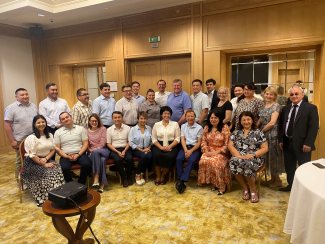UNODC conducted Regional Training of Trainers on UTC 13 in Central Asia

The UNODC Regional Office for Central Asia held a Regional Training of Trainers (ToT) on Course 13 – “Contingency Management: A Reinforcement Based Treatment” which took place in person in Almaty, Kazakhstan on 27-29 July 2022. This course is a part of the Advanced Level of the Universal Treatment Curriculum for Substance Use Disorders (UTC training package).
The twenty (20) members of the national team of trainers from Kazakhstan, Tajikistan and Uzbekistan attended the training delivered by the team of UTC Regional Master Trainers.
“Building on human resources trained already on evidence-based drug dependence treatment and care approaches by UNODC during the past years of implementation, the aim of this training is to further strengthen the level of capacity for drug dependence treatment and care services delivered by addiction professionals at national level in the countries of the region. This support builds on the assumption that the national counterparts can ensure the dissemination of the training further to the level of practitioners through conducting by national trainers the echo trainings on relevant UTC courses.” said Mr. Borikhan Shaumarov, Senior Programme Officer of UNODC ROCA during ceremonial welcome.

During the three days of the training, participants had an opportunity to familiarize themselves with the theoretical foundations of contingency management, learn about existing contingency management interventions and develop the skills to apply them in the treatment of substance use disorders.
“The organization of the training was carried out at a high level, which ensured the possibility of immersion in the educational process in a comfortable atmosphere. Participants not only studied theoretical materials and perform practical algorithms, but also established professional contacts, shared their own practical experience, conducted psychological techniques in a training format and developed presentations with new ideas and plans. The daily stream of brainstorming sessions, mind maps, group discussions and debates kept us in focus in a non-stop manner. The information materials provided to participants were very catching, structural and concise. As a researcher, from the first minutes I noticed that the content of the training course was clearly verified, methodologically justified and had significant scientific support. The trainers performed not only as experienced teachers, but also as sincere friends, sensitive mentors and skillful facilitators. Every hour of working together paved the way for improvement in practical approaches and the emergence of ideas for implementing the acquired skills in drug treatment practice” said Ms. Mariya Prilutskaya, Associate Professor of the Semey Medical University.

The training was organized within the framework of UNODC global project GLOJ71 “Treating drug dependence and its health consequences: Treatnet” in collaboration with Sub-programme 3: Addressing drug problems, increasing treatment of drug use disorders and preventing HIV/AIDS” of the UNODC Programme for Central Asia for 2022-2025 and Prevention, Treatment and Rehabilitation Section, UNODC HQ with financial support from U.S. Department of State’s Bureau of International Narcotics and Law Enforcement Affairs.